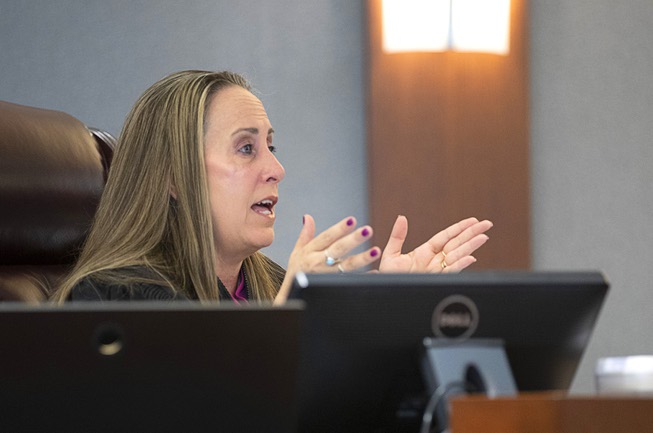
District Court Judge Jessica Peterson, shown during a hearing at the Regional Justice Center Tuesday, Aug. 22, 2023, is being asked by the Clark County Education Association to lift the injunction she set against the teachers union to prevent further strikes. CCEA contends the union and the Clark County School District, with a new contract in hand, are at labor peace and the need for the injunction has passed.
Published Tuesday, Aug. 22, 2023 | 10:24 a.m.
Updated Tuesday, Aug. 22, 2023 | 5:02 p.m.
A Clark County District judge declined to issue an injunction today to prevent teachers from striking.
Judge Jessica Peterson also said she found recent comments made by Clark County Education Association Executive Director John Vellardita “concerning” but stopped short of issuing the injunction CCSD had sought against CCEA, saying she didn’t have enough information to do so.
“In order for the court to issue an injunction, the court has to find that a strike will occur. At this juncture, the court does not have enough (information). Even though the statements of Mr. Vellardita, the executive director of CCEA, are concerning, there is not enough at this stage, right now, for the court to say that unless enjoined that a strike will occur,” she said at the end of the 90-minute hearing.
“However, I will… make it known to both sides that if something were to happen, the court would entertain on a one-day notice, on an order-shortening time, to get back into court very quickly.”
Peterson’s decision comes three weeks after CCSD sued the teachers union, citing comments made by union members and leadership the district interpreted as credible threats to strike. Union leaders and members have said “work actions,” as Vellardita has phrased them, are possible if the union does not have a new contract by Saturday.
In a statement, the district said it was disappointed that an injunction was not granted, but “we are pleased that the court took CCEA’s threats seriously and warned CCEA that with any additional evidence of coordinated work stoppages, slowdowns or interruption of operations, the parties will return to the court with a day’s notice.”
The union said in its own statement that “the court saw through CCSD’s frivolous lawsuit and did not grant what they were requesting. This is a victory for 18,000 educators and their First Amendment rights. Educators will not be silenced.” The Sun received the written statement through a third party because CCEA has stopped talking to the newspaper and its reporters.
Union President Marie Neisess — a named defendant in the lawsuit along with Vellardita, the union’s vice president, and the union as an organization — similarly said that children need qualified teachers, and educators want their voices heard.
“Ultimately, this entire time, the district has done everything in their power to shut out voices, and we will not be shut up,” she said. “We will not be shut down.”
Strikes by government employees, including public school teachers, are illegal in Nevada. The law defines “strike” broadly to include work stoppages, slowdowns, sickouts and interference with operations. Employers may also request courts to prevent threatened strikes.
Among other demands in the bitter negotiations, CCEA is seeking 18% across-the-board pay raises over two years. The union is also seeking additional compensation for special education teachers, teachers in high-vacancy, typically low-income schools, and an increased pay rate for teachers working extended-day hours at certain campuses.
Peterson’s decision aligned with one of the arguments made by union lawyers, whotold the judge that CCSD’s case was premature. The union has said it planned to vote on work actions on Saturday — a day that hasn’t come yet.
“Isn’t it premature?” she said. “Because I can’t — just as a jury cannot base their decisions on speculation — I can’t base my decision on speculation and conjecture.”
Union lawyer Bradley Schrager said union members’ rights to free speech were at issue.
“I think it’s important for the union, for the district, for the public, for the student and the teachers to understand something about democracy at work, and the First Amendment in practice and action,” he said. CCSD lawyer Ethan Thomas argued that Vellardita — who was not present at the hearing — had demonstrated both a recent and longer-established tendency to threaten strikes. With a full-union meeting planned for Saturday, with no settled contract nor additional negotiation dates scheduled before then, Thomas said there was no feasible way to prevent a strike without an injunction.
“I can understand that the court needs to feel confident that its action is necessary to prevent a strike,” he said. “But we would posit that the evidence that we’ve submitted, the statements that they’ve made, don’t just reveal that there’s been a few members of the union that have made comments, but that the executive director of CCEA’s comments have detailed what his own membership has already set forth in terms of a plan.”
In its filings, CCSD has pointed to a local radio interview where Vellardita said, “There’s not going to be a school year without a contract,” a local podcast interview where he did not explicitly disavow a strike, and a television interview where he said nothing was off the table.
Peterson acknowledged that Vellardita’s words carry weight.
“If these were just individual members saying, ‘Oh, well, if we don’t get our contract, we’re going to strike.’ I think that’s very different than when the executive director of CCEA makes the comments that if we don’t get a contract, that school is not going to open,” she said. “The executive director obviously is acting as an agent of CCEA, and has a little bit more authority.”
This is a developing story. Check back for updates.

